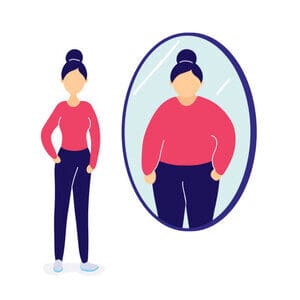Disordered Eating
- Home
- Disordered Eating
Disordered Eating & Eating Disorders
Disordered eating is used to describe a range of irregular eating behaviors that may or may not warrant a diagnosis of a specific eating disorder.
Eating disorders, such as anorexia nervosa, or AN, or bulimia nervosa, or BN, are diagnosed according to specific and narrow criteria. This excludes a majority of people suffering with disordered eating.
Many individuals with disordered eating symptoms are diagnosed with Eating Disorder Not Otherwise Specified, or EDNOS. However, similar to AN or BN, EDNOS has specific criteria that must be met in order for the patient to receive this diagnosis, and that criteria also is narrowing.
Video Resource

Signs and symptoms of disordered eating may include, but are not limited to:
Frequent dieting, anxiety associated with specific foods or meal skipping
Chronic weight fluctuations
Rigid rituals and routines surrounding food and exercise
Feelings of guilt and shame associated with eating
Preoccupation with food, weight and body image that negatively impacts quality of life
A feeling of loss of control around food, including compulsive eating habits
Using exercise, food restriction, fasting or purging to “make up for bad foods” consumed

Many people who suffer with disordered eating patterns either minimize or do not fully realize the impact it has on their mental and physical health. This lack of understanding may unnecessarily exacerbate the harm of disordered eating. Detrimental consequences can include a greater risk of obesity and eating disorders, bone loss, gastrointestinal disturbances, electrolyte and fluid imbalances, low heart rate and blood pressure, increased anxiety, depression and social isolation.
Disordered eating is a serious health concern that may be difficult to detect since a person with disordered eating patterns may not display all of the classic symptoms typically identified with eating disorders. It’s important to remember that even a person exhibiting disordered eating habits and behaviors also may be experiencing significant physical, emotional and mental stress.
Registered dietitian nutritionists are vital to the detection and treatment of disordered eating. Often, patients referred to dietitians for nutrition counseling are unaware that their eating patterns are problematic or harmful. Working with a dietitian who has a background in counseling patients with eating disorders is an important step in treating disordered eating and preventing it from progressing to an eating disorder.
https://www.eatright.org/health/diseases-and-conditions/eating-disorders/what-is-disordered-eating
At Astute Counseling Services, we practice “Body Positive” interventions to treat Disordered Eating with an emphasis on self love, gaining control back, general health and happiness.